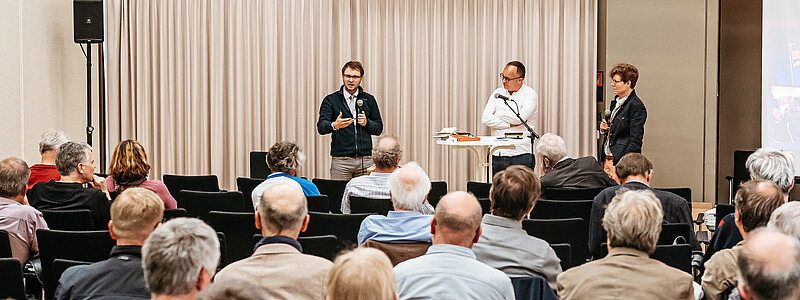“The history of the Anabaptists and their significance for the present”
Workshop on “500 Years Anabaptist Movement” at the 2023 General Conference of the German Baptist Union
At this summer’s German Baptist Union conference there was a workshop devoted to anabaptism. One of the speakers was the AMN trustee, Joshua Searle. The focus of the workshop was on how past generations have viewed the Anabaptists and the relevance of Anabaptism for the present day.
The first speaker was the renowned anabaptist historian, Martin Rothkegel, who serves as Professor of Church History at the Theologische Hochschule Elstal. In his presentation, Rothkegel outlined the historical development of the debate on the Anabaptists during the Reformation, both within Germany and in other countries. The formative founding figures of the German Baptists were very careful that their congregations were not associated with the notorious Anabaptists. This was related to the fact that the German-speaking public primarily associated the Kingdom of Münster in the years 1534 and 1535 with the keyword “Anabaptist”. There the introduction of the Reformation and the abolition of infant baptism had been enforced with brute force. It was only in the course of the 19th century that people recognized “that the great majority of the Anabaptists had been consistently non-violent and that their teaching was genuinely reformatory.” At the end of his presentation, Rothkegel presented topics that were important to the early Anabaptists, such as dealing with the Bible, non-violence, unity of the congregations, freedom of belief and conscience, the separation of church and state and the handling of property.
The prominent anabaptist historian Dr. Astrid von Schlachta, Chair of the Mennonite Historical Association (Mennonitischen Geschichtsvereins), asked in her contribution: “What remains of the Anabaptists after 500 years?” She identified four main points. First, she mentioned non-violence. “The reason for their persecution and expulsion was that the Anabaptists did not take up arms in the 16th century, but wanted to live a non-violent life,” said von Schlachta. It is clear that the principle of non-violence is a challenge for every society up to the present time of a not-too distant war in Ukraine. Secondly, tolerance in the sense of understanding and respecting “the other”, is also sustainable “for today from the historical experience of the Anabaptists”. While today’s culture of debate tends to quickly exclude other opinions and classify them as illegitimate, the Anabaptist example encourages us “to protect minorities and to counteract their discrimination and stigmatisation.” And finally, non-conformism is inherited from Anabaptism: “Let’s position ourselves, even against the mainstream! Let’s raise our perhaps non-conformist, critical voice!” Astrid von Schlachta called out to the workshop participants.

In an interview with the British theologian, Dr Joshua Searle, who was recently appointed professor of missiology at the Theologische Hochschule Elstal, Searle spoke about the importance of the Anabaptist movement in Great Britain. “It is probably no exaggeration to speak of the end of Christianity in Britain today,” Searle said. “We are in a crisis, but this is also an opportunity to discover new impulses. We have a lot to learn from the Anabaptists about how to live faithfully in a condition of cultural and social exile.” Searle pointed out the important role played by the Anabaptist Mennonite Network in Great Britain, which was founded by the British theologian Stuart Murray and which finds inspiration in the values and practices of the early Anabaptist movement of the sixteenth century. “At the core of Anabaptist spirituality is discipleship”, Searle said. The anabaptists tradition thus includes many treasures of wisdom that can inspire Christians today who seek to live out their faith in a contemporary way.
After the plenary papers and interview, there were small group sessions. The workshop finished with a lively and informative plenary question and answer session. It was good to be able to learn more about the history and continuing relevance of the Anabaptist movement for the church and wider society today and I (Joshua) was glad of the opportunity to share about the work of the Anabaptist Mennonite Network to delegates of the German Baptist Union (BEFG).
*A full report on the workshop (in German) can be found here: https://www.befg.de/aktuelles-schwerpunkte/nachrichten/artikel/die-geschichte-der-taeufer-und-ihre-bedeutung-fuer-die-gegenwart/